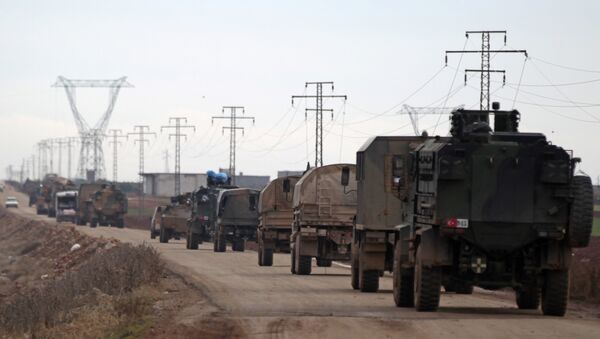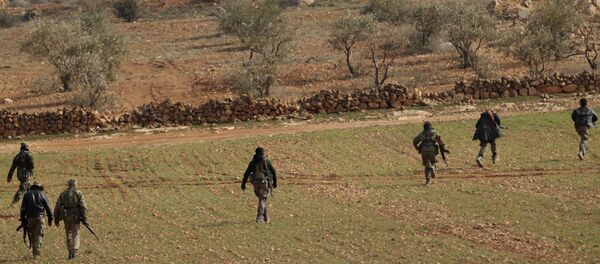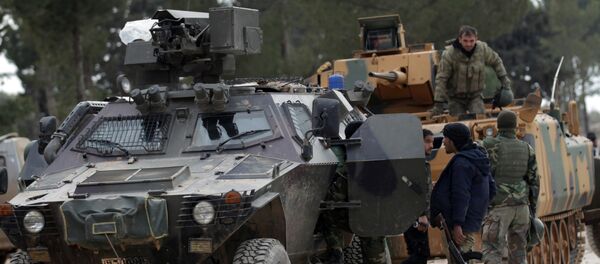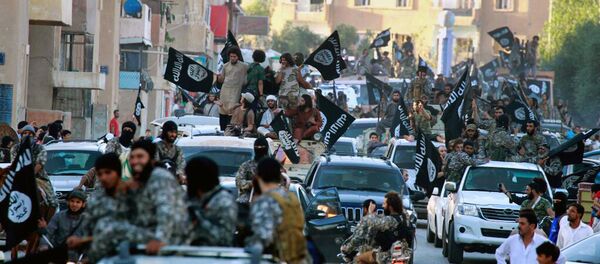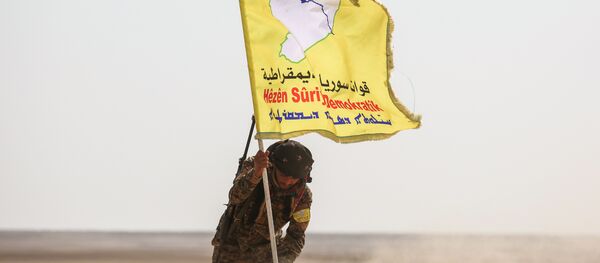The Situation on the Ground
The Euphrates Shield operation was launched in August. Its declared goal was to maintain security at the Turkish-Syrian border and liberate the border regions in northern Syria from Daesh militants and Kurdish troops, according to Foreign Minister Mevlut Cavusoglu. The offensive was not authorized by the Syrian government led by President Bashar Assad.
Turkey’s military actions in northern Syria are also aimed at containing the Kurdish People’s Protection Units (YPG) forces and preventing the Kurds from uniting two their enclaves in northwestern and northeastern Syria. Ankara regards the YPG as the combat wing of the Kurdistan Workers’ Party (PKK) which is outlawed in Turkey.
The situation near al-Bab is further complicated by the presence of Syrian troops backed by the Russian Aerospace Forces. The Syrian military is running an offensive on Daesh from the south.
On January 12, the defense ministries of Russia and Turkey signed a memorandum of understanding to coordinate their counterterrorist actions in Syria. Starting January 18, Russian and Turkish warplanes carried out a series of joint airstrikes on Daesh targets near al-Bab.
However, despite the coordination efforts, on February 9, three Turkish servicemen were killed and over 10 were injured as a result of a Russian airstrike near al-Bab. The Russian Defense Ministry said that it received the coordinates from the Turkish side.
Next Stop Raqqa
Erdogan also stated that the ultimate goal of the Turkish military operation in northern Syria is to free the region, including Raqqa, the de facto capital of the Daesh, from terrorists and Manbij, in northeastern Aleppo, from YPG forces.
The president added that after Daesh is defeated, Turkish troops will leave northern Syria.
"After removing Daesh, the YPG and the PYD [the Syrian-Kurdish Democratic Union Party] from the region and getting Daesh out of Raqqa, it will be too much of a luxury for us to say there. But it is currently too early to talk about such issues," Erdogan said.
Former United States President Barack Obama opposed the initiative, arguing that security could be established only via increased military presence, including ground forces and missile defenses. However, new US President Donald Trump has spoken out for such "safe zones."
If the Turkish military continues to advance on Raqqa it will face the Syrian Army which is currently deployed south of al-Bab, according to Leonid Isayev, a specialist in Orientalist studies. If Turkey continues the offensive on Manbij it will confront Kurdish forces controlling the city.
"A Turkish confrontation with the Syrian Army will put Moscow in the hot seat while a confrontation with Kurds will create troubles for Washington," Isayev told RBK.
"But if Erdogan finally decides to move, the Turkish military will concentrate on Manbij because the fight against the Kurds is the priority for Ankara," he added.
According to Hasan Kanbolat, head of the Ankara Center for Political Studies, Turkey is mulling ending its military operation in northern Syria and wants to launch an operation in Raqqa, together with the US and with support from Russia.
"Turkey needs to fling back Daesh from its border to the south as far as possible. Thus, Ankara says it should be involved in an operation in Raqqa. But Turkey cannot go there alone. Ankara expects to join forces with the US-led coalition and have support from Russia," Kanbolat told Sputnik Turkiye.
Kurds Will Not Give Up
Meanwhile, retired Lieutenant-General of the Turkish Air Force, Erdogan Karakush suggested that the liberation of the city does not mean that Turkish troops would leave the area right away.
However, earlier this week, President of Kobani Canton, Syrian Kurdistan, Anwar Muslim told Sputnik that Kurds will prevent Ankara from taking control over Syrian territories liberated from Daesh in northern Syria.
"Manbij is autonomous now. We were helping locals to liberate it from the Islamic State [Daesh]. If they ask us again, we will help, of course. We will not put Manbij under Turkish control," Muslim said.
"We regard Turkey, which sent its troops to Syria, as occupants. Sooner or later they will have to leave Syria," Muslim noted.
According to Ilham Ehmed, co-leader of the Syrian Democratic Council and a senior member of the Democratic Union Party (PYD), "the military council and locals will mount fierce resistance if Manbij is attacked [by Turkey and its allies]."
Ehmed also suggested that Turkey is not interested in bringing peace and stability to Syria.
"Ankara is trying to take Syria under control by seizing Manbij and other regions. This lies at the heart of its intervention and combat operations in Syria," she told Sputnik Turkiye.
Never miss a story again — sign up to our Telegram channel and we'll keep you up to speed!

